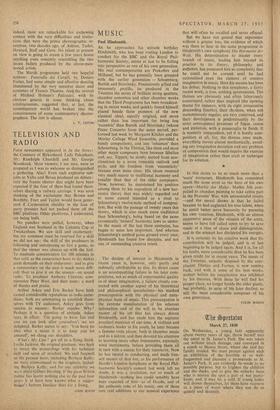Paul 'Hindemith.
As he approaches his sixtieth birthday Hindemith, who has been visiting London to conduct for the BBC and the Royal Phil- harmonic Society, seems at last to be falling into perspective as one of his own generation. His real contemporaries are Prokofiev and Milhaud, but he has generally been grouped with the earlier generation — Schoenberg, Bart6k and Stravinsky. Precociously gifted and immensely prolific, he produced in the Twenties the series of brilliant string quartets, chamber concertos and other chamber works that the Third Programme has been broadcast- ing in recent weeks, and quickly found himself placed beside these pioneers of the new classical ideal, equally original, and more rather than less important for being less 'eccentric'than Bart& and Stravinsky (whose Piano Concerto from the same period, per- formed last week by Margaret Kitchin and the Morley College Wind Ensemble, provided a handy comparison), and less 'inhuman' than Schoenberg. In the Thirties, like them and most other major composers born between Sibelius and, say, Tippctt, he slowly turned from neo- classicism to a more romantic outlook and style, and his freedom from 'eccentricity' became even more clear. His idiom reverted very much nearer to traditional harmony and tonality than that of the older composers. Now, however, he maintained his position among them by his exposition of a new har- monic theory that was widely regarded and to some extend intended as a rival to Schoenberg's twelve-note method of composi- tion. But with the passage of twenty years this theory, which is also much more traditional than Schoenberg's, being based on the same acoustically 'natural' harmonic laws as under- lie the music of the last three centuries, has begun to seem less important. And whereas Schoenberg's method gains ground every year, Hindemith has found few disciples, and not one of outstanding creative talent.
The decline of interest in Hindemith in recent years is, however, only partly and indirectly attributable to this. Its direct cause is an accompanying failure in his later com- positions, not so much of experimental quality as of sheer imagination, a failure closely con- nected with another aspect of his theoretical and philosophical speculations—his marked preoccupation with the physical and meta- physical basis of music. This preoccupation is the extreme manifestation of his inherent rationalism and of the will to be absolute master of his art that has always driven Hindemith, and has made him the supreme practical musician of our time. A violinist and orchestra leader in his youth, he later became a famous viola player, both in chamber music and as a soloist, and then devoted his attention to learning many other instruments, especially wind instruments, before providing them all in turn with a sonata for their repertoire. Now he has turned to conducting, and made him- self master of that too, as his performance of Haydn's London Symphony at the Royal Phil- harmonic Society's concert last week left no doubt. It was a revelation, not so much of Hindemith—nothing less could sensibly have been expected of him—as of Haydn, and of the authentic tone of his music, one of those rare real additions to our musical experience
that will often be recalled and never effaced.
But we have not gained that experience without a greater loss, the evidence of which was there to hear in the same programme in Hindemith's own symphony Die Harmonic der Welt. His determination to master every branch of music, leading him beyond its practice to its theory, philosophy and esthetics, has possessed him so completely that he could not be content until he had rationalised even the clement of creative imagination in music. Here his success has been his defeat. Nothing in this symphony, a fairly recent work, is free, nothing spontaneous. The themes are obviously and often laboriously constructed, rather than inspired (the opening theme for instance, with its eight consecutive descending fourths), their rhythms, when not monotonously regular, are very contrived, and their development is predominantly by the strict contrapuntal processes of fugue, canon and imitation, with a passacaglia to finish. It is masterly composition, yet it is hardly com- position at all, for, the themes once made, everything moves almost mechanically, avoid- ing any imaginative deviation and any problem of composition that would require the exercise of imagination rather than craft or technique for its solution.
In this desire to be so much more than a 'mere' composer, Hindemith has committed much the same error as the hero of his own opera—Mat/us der Maler. Mathis felt com- pelled to abandon painting to take active part in the Peasants' War, with unsuccessful results —and the moral drawn is that he failed because he had neglected his true talent, when he could better serve humanity by pursuing his own vocation, Hindemith, with an almost oppressive sense of the mission of the artist, seems to have felt called upon to try to save music at a time of chaos and disintegration, and in the attempt has dissipated his energies.
It is certainly by his creative work that his contribution will be judged, and is at last beginning to be judged again. And it is, for all his faults, more considerable than he has been given credit for in recent years. The music of the Twenties, unjustly despised by the com- placent Thirties and Forties, is now coming back, and with it some of his best works. written before his imagination was inhibited by his theories. With these he will find his proper place, n6 longer beside the older giants. but probably, in spite of his later decline, as still the most considerable composer of his own generation.


































 Previous page
Previous page